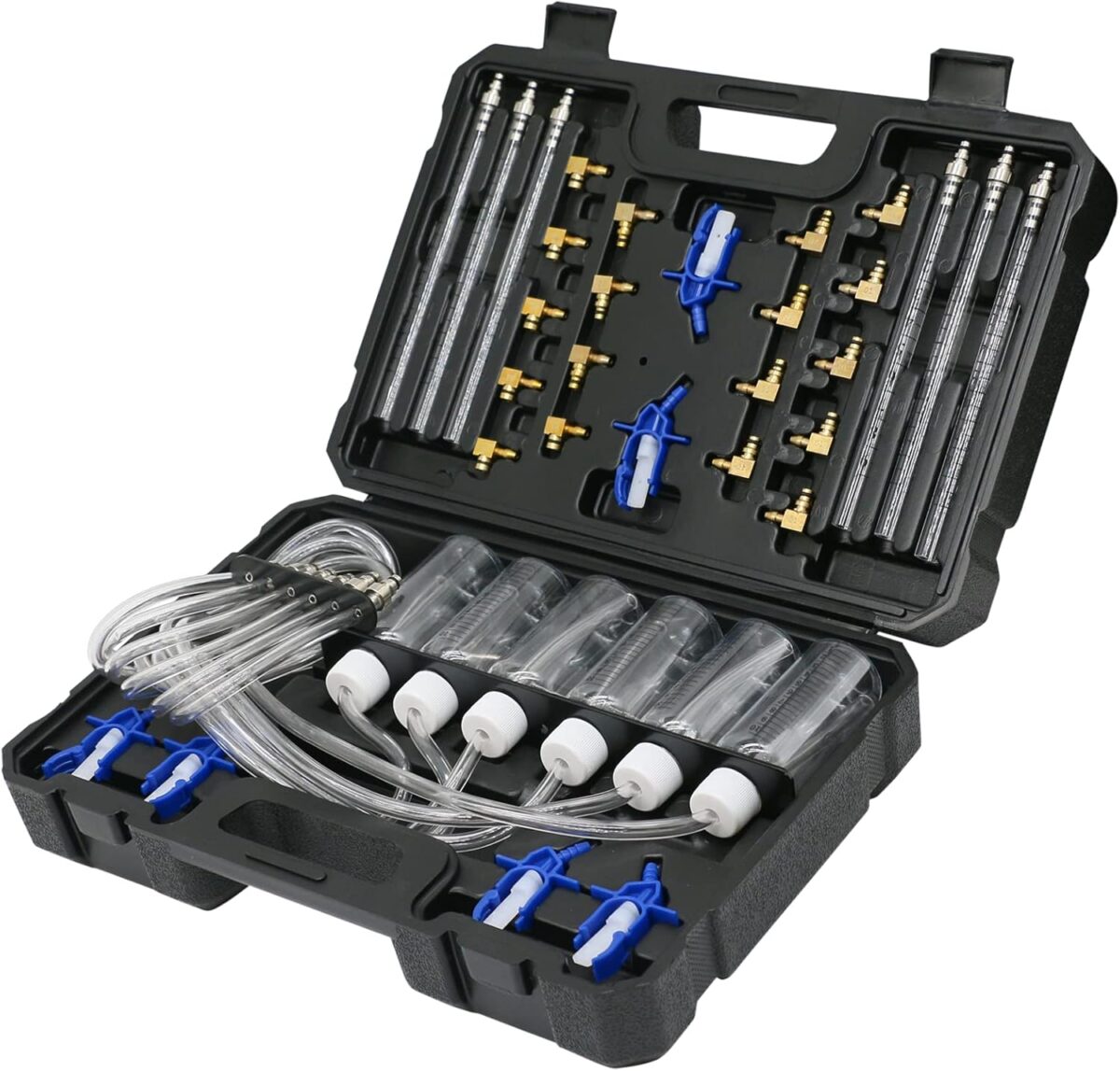Injectors play a central role in the operation of a diesel engine. Unlike petrol engines, diesel engines have no ignition, and therefore no ignition coil. This is due to the very specific behavior of diesel, which does not burn with a spark like gasoline, but explodes when compressed. In a diesel engine, the injector is therefore the central part to watch, since it alone controls the engine's behavior. When injectors start to fail, symptoms appear progressively, and the consequences can be far-reaching. Regular checks are therefore crucial, especially for BMW diesel engines (e.g. M57, N57, B47...).
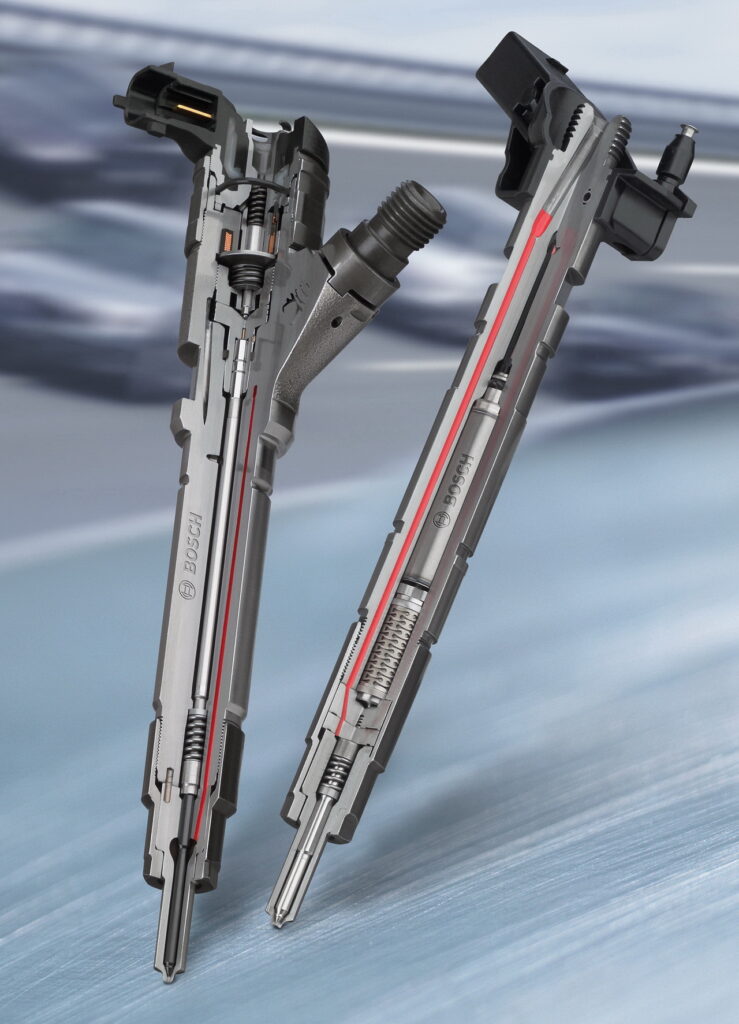
Symptoms and consequences of defective injectors
Here's what you can see if the injectors aren't working properly:
- Power loss or slow ramp-up: the engine no longer receives the right volume of fuel at the right time, combustion is inefficient.
- Excessive smoke (black, blue or grey): poor atomization or excessive fuel return can lead to incomplete combustion or excess fuel.
- Excessive fuel consumption: if some of the fuel injected doesn't burn properly or returns to the tank, efficiency drops.
- Difficult starting or unstable idle: the worn injector no longer delivers the required flow or has internal leaks.
- Premature component wear: a high fuel backflow can prevent the rail pressure from reaching the rated value, fatiguing the high-pressure pump and the rail, and leading to costly repairs.
- Poor performance, higher-than-standard emissions, risk of triggering an engine light or engine reset (ECU), or an EGR, injector or rail fault.
In short: testing injectors can detect a problem before that it does not seriously affect your BMW engine and result in high repair costs.
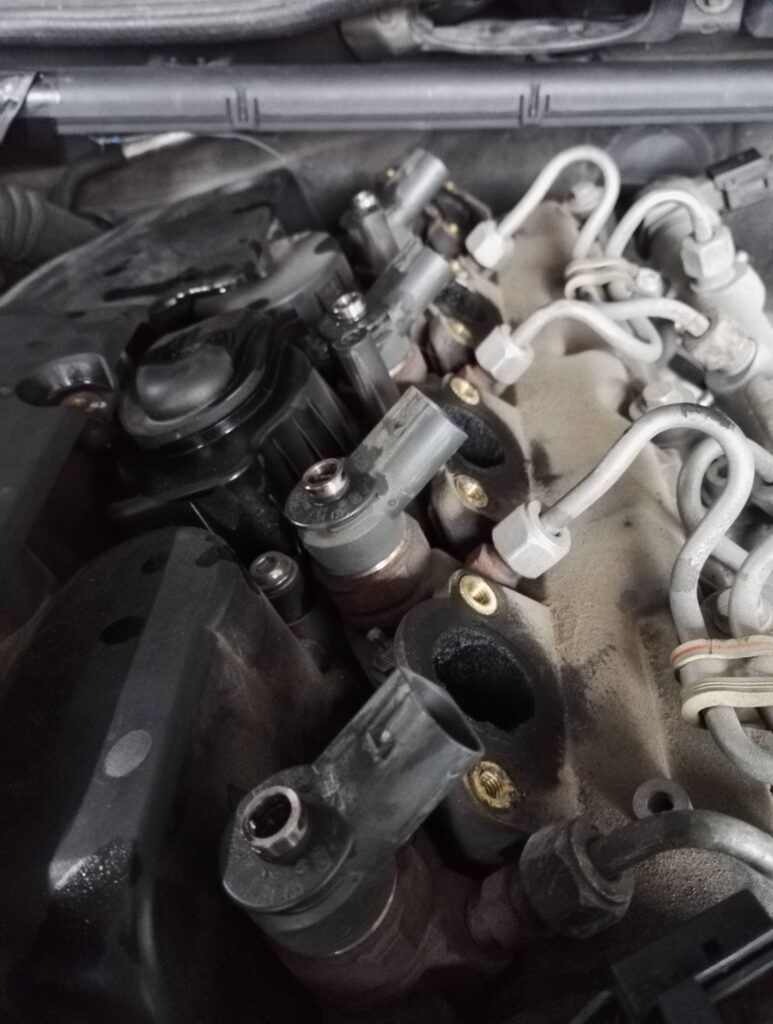
Diesel injector operation
Understanding the role of injectors is essential to grasping the importance of the test.
Principle and role in the engine
- Diesel injectors inject fuel directly (for modern common-rail systems) into the combustion chamber. They must deliver precise flow, exact timing and good atomization to ensure efficient combustion.
- Modern BMW diesel engines (e.g. N57, B57...) feature high-pressure common-rail systems, often up to 1,600 bar or more. For example, the M57 engine uses a Bosch common-rail system with a CP3 high-pressure pump and a pressure of up to 1,600 bar.
- Some of the fuel injected but not used returns to the tank via the leak-off line. This return allows the injector to cool, lubricate and regulate pressure. When this return is too high or too low, it indicates that the injector is no longer operating to specification.
Main components
- Fuel line to injector.
- The injection element (solenoid, or piezoelectric in some cases) which opens/closes according to a signal from the ECU.
- The outlet that sprays fuel into the combustion chamber.
- Leak-off line: uninjected fuel returned to the tank or return manifold.
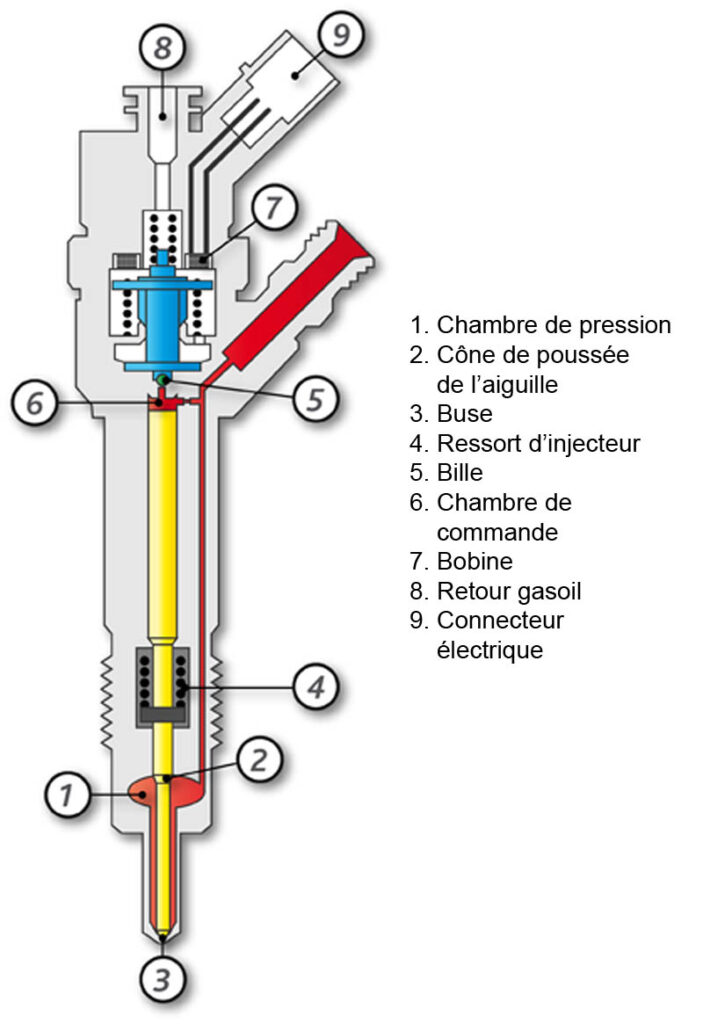
The different types of diesel injectors
There are several injector technologies in use, depending on engine era and brand. Here's an overview:
- Unit-injector pump Old technology: each cylinder has an integrated pump-injector. Rare on recent BMWs.
- Common-rail with solenoid The common rail supplies fuel at very high pressure, and the injectors are electrically controlled. Common on BMW 4 & 6-cylinder diesels.
- Piezoelectric common-rail At the top end of the range, the injector is opened by a piezo signal for greater speed and precision. For example, some versions of the M57 engine use piezoelectric injectors.
- Sequential or multiplexed injector for certain engines or specific markets.
Each type has its own specific features in terms of flow rate, opening time, fuel return, etc.
Most common diesel injector brands
When it comes to BMW diesel engines, the following major brands are often mentioned:
- Bosch: very present in BMW common-rail systems (CP3 pump, injectors, rails...).
- Delphi: injectors, system modules, return for certain generations.
- Siemens (now Siemens VDO, Valeo): injectors or control units on certain engines.
- Denso: less common on BMW diesels, but well known in the industry.
Knowing the brand of injector installed in your BMW helps you choose the right adapter or check compatibility.
Technologies used by BMW for its diesel engines
For the engines mentioned (M47, M57, N47, N57, B47, B57...) here are some technical specifications:
- M57 engine (6-cylinder): Bosch common-rail, injection up to ≈ 1,600 bar, piezoelectric versions on some variants.
- N57 engine: replaces the M57, uses aluminum construction, variable-geometry turbo, piezo or solenoid injectors in modern versions.
- M47/N47/B47 (4-cylinder diesel): BMW common-rail 4-cylinder diesel versions, sharing similar injection components.
- BMW favors high-pressure, common rails and fast injectors for performance and low emissions.
For a BMW diesel owner, this means that injectors are precision components, and abnormal fuel return has a significant impact.
Why our kit is suitable for BMW engines and what advantages it offers
Adaptation to BMW engines
- The kit enables up to 6 injectors to be tested simultaneously: ideal for BMW 6-cylinder engines (M57, N57, B57). (e.g. 330d, 530d, 730d, X3 30d, X5 30d).
- It also works for BMW 4-cylinder diesel engines (M47, N47, B47) using 4 cups from the kit. (e.g. 320d, 520d, X1 20d, X3 20d).
- It includes a large number of adapters (24 pieces) covering a wide range of injector brands (Bosch, Delphi, Siemens, etc.), maximizing compatibility with BMW or aftermarket injectors.
- Since leak-off is exactly what this kit measures, it responds directly to a recognized test: the «Back-Leak (Return Flow) Test», which is recommended for identifying worn injectors in their early stages.
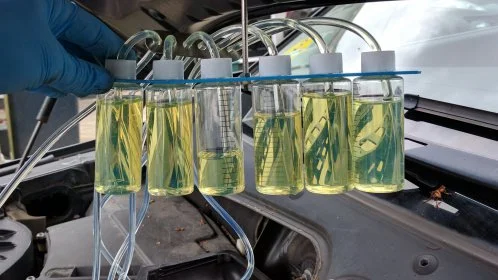
Kit benefits
- Precision Graduated cups, under-hood attachment bar, storage case - everything is designed for precise, practical use.
- Speed In a single test session, you can obtain the values of all injectors (up to 6) and compare the fairness between cylinders.
- Prevention Identify a faulty injector before it impacts the rail, pump or other costly components.
- Ease of use no need to dismantle the injectors completely for an initial test.
- Targeting BMW By presenting this kit on Macote.eu, you position yourself as a BMW specialist, which reassures customers who own a BMW diesel model. This enhances credibility and encourages purchases.
Concrete example of use
An owner of a BMW 530d (with M57 engine) noticed a slight loss of power and slightly higher fuel consumption. He uses this kit to measure the fuel return of his injectors. He discovers that the cylinder 4 injector has a higher return 30 % than the others. He decides to replace it before it causes a rail fault or an engine warning light. Result: performance restored, consumption stabilized, peace of mind over the long term. What's more, not all injectors need to be changed without knowing who's responsible, which can quickly add up to big savings at 300 euros per injector.
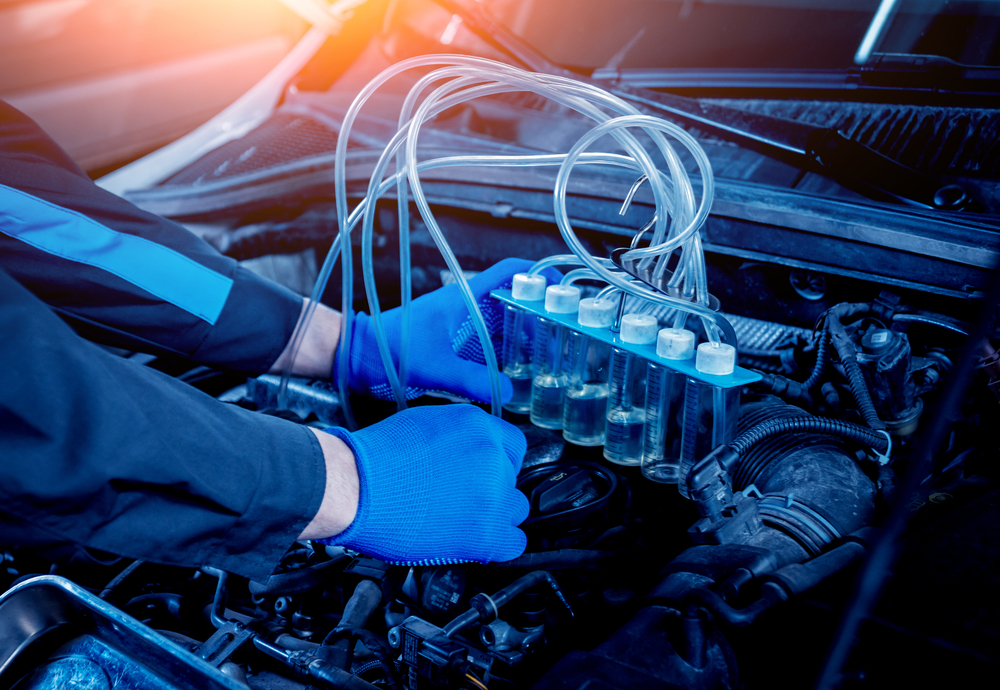
Test, diagnose and save: a smart move
Carrying out a return test with our kit is not just for BMW owners, but for all common-rail diesel drivers.
The main interest: isolate the really faulty injector without replacing the whole set.
A Bosch injector costs on average about €300 each, sometimes more on some modern engines.
On a 6-cylinder, replacing six injectors «as a precaution» represents nearly €1,800, often useless if only one is involved.
Thanks to this test, you can identify the faulty injector and avoid blind replacements. You'll save several hundred euros and extend engine life.
It's a small investment for a professional in-home diagnosis.
In a nutshell
Testing your injectors means :
- Maintain the original performance of your BMW engine.
- Reduce consumption and emissions.
- Avoid heavy repairs.
- Save several hundred euros by targeting the right injector.
👉 Discover the BMW-compatible diesel injector test kit on Macote.eu
The choice of demanding drivers who want to understand, diagnose and preserve the mechanical performance of their BMW diesel.
Diesel injector test kit - injector return flowmeter for BMW 4 & 6 cylinders (M57, N57, B57...)
Professional diesel injector return test kit - 24 pcs set compatible with BMW M47, M57, N47, N57, B47, B57 and other common-rail diesel engines. Allows simultaneous testing of up to six injectors to detect faults quickly and accurately without disassembly.

